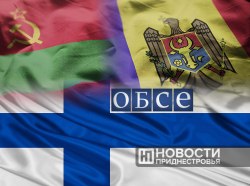Tiraspol-Chisinau, February 2. /Novosti Pridnestrovya/. Today, at the first plenary session of this year, the Parliament of Moldova adopted in the final reading the sensational amendments to the Criminal Code - the so-called law on separatism. Moldovan legislators have not listened to the voices that have been urging the decision to be reconsidered over the past two months.
The bill was voted on by 60 deputies from the ruling Action and Solidarity (PAS) party. In addition to them, 6 more parliamentarians from the Bloc of Communists and Socialists were present in the hall. Five of them abstained from voting, while only the socialist deputy Fedor Gagauz spoke out "against".
Now the law adopted by the Parliament must be promulgated, that is, published, by the President of the Republic of Moldova, Maya Sandu. We are pretty confident that they will not wait. After that, the law will come into force.
What Do the Amendments Mean and What Has Changed Before the Final Reading?
As we already noted, the "law on separatism" introduces eight new articles into the Criminal Code of Moldova. Two of them relate to new concepts - "anti-constitutional subject" and "illegal information structure", which were not previously in the Criminal Code of the Republic of Moldova. Six more impose sanctions for “serious threat to the security of the Republic of Moldova”, “creation of an illegal information structure”, “conspiracy against the Republic of Moldova”, “unauthorized collection of information”, “separatism”, “failure to report crimes committed against the state or national security ".
In the final version of the document, all these eight articles were preserved - only some editorial changes were made to them before the second reading. Moldovan legislators found it not enough and increased the prison term. For example, the first part of the article “Separatism” assumed a maximum punishment of up to 5 years in prison, but then it was raised to 6 years.
The deputies from PAS did not stint on terms. The article “Serious threat to the security of the Republic of Moldova” provides for up to 20 years in prison. For "creating an illegal information structure" you can get up to 10 years. For "conspiracy against Moldova" - up to 7 years, and for "separatism", depending on qualifications - from 2 to 12 years.
How Can These Amendments Threaten the Inhabitants of Pridnestrovie?
During the preliminary hearings, representatives of the special services of Moldova did not hide the fact that the "anti-constitutional subject" for them is Pridnestrovie. And they weren't the only ones who said that. PAS MP Oazu Nantoi (who, of course, today voted for the "law on separatism"), in the context of all this, said that Pridnestrovie is "an unconstitutional entity that has no right to exist."
In fact, with the current amendments to the Criminal Code, to the delight of people like Nantoi, Moldova is returning to the rhetoric of the 90s of the last century – to all this “restoring constitutional order” (everyone remembers what it led to) and so on.
Representatives of the same Moldovan special services directly indicated that the power structures of Pridnestrovie, in particular, the Government and the Supreme Council, would get under the “law on separatism”. But if you read the provisions of the law adopted today, then the threat may be not only for them but indeed for many other people, including those who are not related to any government.
For example, in the “tough” article “Serious threat to the security of the Republic of Moldova”, it is proposed to give from 12 to 20 years in prison for “assisting an anti-constitutional entity in carrying out activities hostile to the Republic of Moldova”. Anything that comes into the Moldovan security forces` heads can be considered as "assisting" and "hostile activity". As once in Soviet times, anything could be interpreted as falling under Article 58.
Or, say, in the article "Separatism" there is part 2 "Incitement to separatism." This refers to "the dissemination of objects, the production and/or dissemination in various types of media of materials and/or information inciting separatism." That is, Pridnestrovian journalists, go here. But, again, not only them. Any resident of Pridnestrovie who, for example, says on Facebook that the PMR is not on the same path as today's Moldova, or posts Pridnestrovian symbols, risks getting a criminal fine of 35,000 to 75,000 lei or even a prison term of up to 3 years.
This is absurd, readers will say. Absurd, indeed. But according to the letter of the law adopted today, this is possible.
What Now?
And now Pridnestrovie needs to think about how to respond to the legislative innovations of the Moldovan authorities and what, possibly, response measures to take. We will not prejudge events here. It is necessary to start with a detailed legal analysis of the "law on separatism", not only involve local, but also Russian lawyers.
The question of how the law adopted today will affect the negotiations between Tiraspol and Chisinau will certainly be seriously raised. Pridnestrovie has repeatedly noted that it will undermine these negotiations. Is this what they try to achieve in Chisinau? Some sympathizers of the current Moldovan Government, for example, a former member of the JCC from Moldova, Ion Leahu, directly say: “perhaps these amendments to the Criminal Code were made ... to exclude negotiations with these people [Pridnestrovian representatives].”
Vladimir Dmitriev








